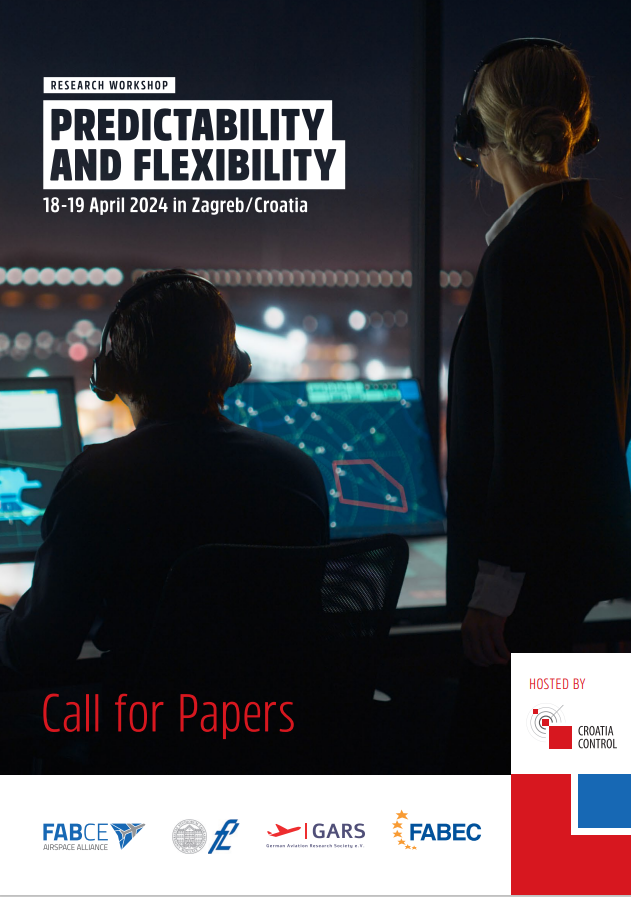FAB CE and FABEC are continuing the series of successful annual InterFAB research workshops with a forum in April 2024 dedicated to predictability and flexibility. These both central aspects in ATM are identified in the ICAO Framework as key performance areas determining the quality of the operational service provided to the civil and military airspace users.
Aviation – and thus air traffic management – faces substantial changes due to geopolitical, economic, environmental and social developments forcing air navigation service providers to act as flexibly as possible without endangering the robustness of the European aviation network. Therefore, it is crucial to know to what extent, when and on which level of accuracy traffic developments can be predicted. Thus, all aviation partners play their part in the operational value chain, in quantitative, time and spatial distribution. Acknowledging that the accuracy of traffic forecasts varies, special attention should be given to contributions showing how operational flexibility in terms of offer / demand may be adapted. Modern statistical methods and innovative technologies and concepts such as artificial intelligence may pave the way for a better use of new and more detailed data sets supporting both prediction and adaptation – aiming to improve the whole aviation chain. The organisers welcome proposals from academics, scientists and industry experts to submit papers for consideration to participate as speakers. The event is organised in partnership with University of Zagreb and the German Aviation Research Society (G.A.R.S.).
Aim of the workshop
Flexibility and predictability are two sides of the same coin. However, with more and more volatile traffic there seems to be less predictability in air traffic. This increases the need to become more and more flexible to adapt to a changing environment. The workshop aims at getting more grip on how predictability and flexibility in air traffic management and its infrastructure could be increased whilst understanding which factors are impacting them.
Questions to be answered
Topics will include lessons-learnt on the quality of predictions as well as capabilities to be flexible in a faster changing environment:
- What are requirements for accurate traffic predictions? Which time horizons for which areas are needed and what level of accuracy is necessary?
- How in practice are traffic predictions used for capacity planning or what kind of flexibility needs to be foreseen in the planning process?
- How can traffic forecasts be used to handle daily operations in a control center?
- How can flexibility and scalability of capacity be enhanced and what are “flexibility destroyers”?
- Which possibilities and concepts do airspace users, states, national supervisory authorities and air navigation service providers apply in order to enhance flexibility? Are they in conflict?
- Are there metrics which could be used to measure predictability and flexibility?
- Do (the key performance areas) of flexibility and predictability relate to each other?
- Which data is needed to better understand predictability and flexibility with its operational impact?
- To what extent do external factors (weather, special events etc.) impact predictability and flexibility?
- To what extent do military operations impact predictability and flexibility? How to coordinate civil and military operations to make best use of the common resource airspace? Does automation increase or reduce flexibility in ATM? Has automation any other effects on ATM performance?
- Which technologies may support flexibility and predictability?
- How may innovative technological concepts such as automation support (cross-border interoperability, ATM Data Service Provider (ADSP), cloud based services, etc.) flexibility and predictability?
Call for Papers
You are invited to submit an abstract of not more than one page that contains author(s), research question, data gathering, analysis methodology and expected results as a word file or pdf to:
Further updates are to be found at www.fabec.eu
Important Dates
- 01.09.2023 Submission deadline for abstracts (max one page)
- 22.09.2023 Notification of acceptance
- 20.12.2023 Submission for full papers (max eight pages)
- 18/19.04.2024 Workshop
Contact:
Matthias Whittome:

